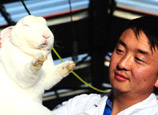
Luxury hotels and high-end restaurants in Shanghai's central Jing'an district are becoming canteens for office workers amid central government calls for frugality and a crackdown on extravagance.
By this month, 180 dining spots in the district, one of the municipality's most prosperous, had signed up for the "White Collar Lunch" project, according to the Jing'an District Commercial Commission, which initiated the project.
It aims to provide affordable meals, priced at around 20 to 30 yuan ($3.20 to $4.80) on average, for the district's 200,000 white-collar workers and create business opportunities for restaurants facing a tough operating environment.
According to the Ministry of Commerce, during the first quarter of this year the high-end dining industry in Shanghai saw a 20 percent fall in revenue, while Beijing's has witnessed a 35 percent drop.
One-third of the 180 venues in Jing'an are five-star hotels and expensive restaurants. The district, which boasts an array of luxury flagship stores, is also the first in Shanghai to launch such a project.
"It's all about business," said Ye Jinghui, deputy director of the commission. Business opportunities will appear as extravagance recedes, according to Ye.
The five-star JC Mandarin Hotel is the latest hotel to join the project. Setting aside a small area of its first-floor cafe, the hotel has been offering a 38-yuan set lunch since May 20.
"Business has been up and down," said Jiang Lili, the hotel's marketing manager. "Seventy to 80 lunches are sold each day, while in good times it could be well over 100."
Although the daily turnover from these budget lunches - about 3,800 yuan a day - falls short of the price for a banquet table at the hotel, Jiang said the lunches are likely to become a long-term venture because "it's a matter of social responsibility".
Zhang Jianjiang is manager of the HanDynasty Restaurant, a high-end eatery more used to serving pricey Shanghai cuisine but now focusing increasingly on budget meals.
The restaurant, one of the earliest to join the project, now sells 1,500 set lunches each weekday. They cost about 20 yuan, and business has been brisk since the start of the year, with queues starting to form as early as 11 am, Zhang said.
The Jing'an Commercial Commission said that in March and April the district's dining revenue saw an 8 percent increase.
















 Turn white rabbit to 'gold' - A young entrepreneur's goal
Turn white rabbit to 'gold' - A young entrepreneur's goal


![]()
